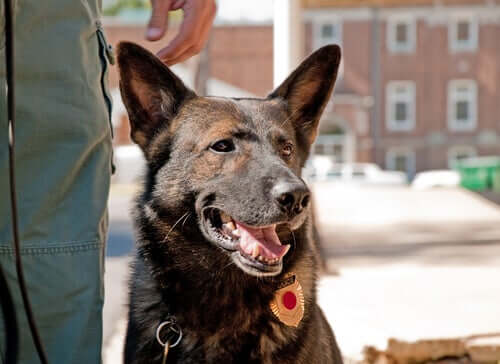Training Police Dogs: From Service to Retirement


Written and verified by the biologist Paloma de los Milagros
It’s been more than a century since police dogs joined the security forces. Their main job is to use their sense of smell to detect things, but their agility and strength in attack also make them perfect for helping to rescue and protect citizens. Discover all about training police dogs in this article.
In 1899, the Belgian Police started the first formal training of police dogs. Given its success, other countries soon followed suit, until the idea of “agent dog” became a global reality.
The life of a police dog can be divided into three stages: training, police service, and retirement. The first is all about obedience and loyalty to their master. The final stage is about integrating them into a different, less strict environment.
Training police dogs
When choosing a dog, forces usually opt for a German Shepherd, Belgian Shepherd, or Labrador. Occasionally, the Beagle, Pointer or Spanish water dog have also been used.
From the possible candidates, staff carry out an initial assessment. This involves checking how willing they are to work and obey orders. The animals they choose will begin their training at about one year old, and their training will focus on socialization. Before learning specific tasks, police dogs need to get used to all sorts of different environments, people, and noises and have to be able to obey their instructor without getting confused.
The main training methods aim to make use of their sense of smell by getting them to search for an object and then give them a reward if they’re successful.

As well as having a good trainer, they also need the right facilities so that they can simulate different risky situations. In these simulations, they’ll train dogs to detect drugs and respond passively, by simply pointing out the location of the drugs, or respond actively by barking or biting.
Some of the most important work police dogs will do involves rescuing people or searching for missing people, suspects or explosive devices. Normally each dog is has a specialization in something according to their skills and abilities. One of the most recent things that dogs have been trained to do is to detect money. This is because of the distinctive ink used on bills.
Retirement or early withdrawal
Every police dog’s career has to come to an end, whether due to lack of fitness, illness, or old age. Most of the time, these animals are adopted by people outside the police community. However, not all homes will be suitable for these animals.

Organizations that arrange this kind of adoption usually carry out interviews with interested people. They will then assess the future owners and their surroundings and contrast them with the dog’s needs.
When it comes to welcoming one of these dogs into a home, it’s really important to remember the strict environment that they’ve come from. Although they can be very obedient, they’ll have some extremely entrenched behavior.
On the other hand, dogs who retire due to illness or a lack of fitness may require special care which isn’t always easy to provide.
In any case, the aim of adoption is to provide the animal with the kind of affection which they won’t have had much of during their police career. This way, they can enjoy the rest of their life in the most pleasant way possible.
It’s been more than a century since police dogs joined the security forces. Their main job is to use their sense of smell to detect things, but their agility and strength in attack also make them perfect for helping to rescue and protect citizens. Discover all about training police dogs in this article.
In 1899, the Belgian Police started the first formal training of police dogs. Given its success, other countries soon followed suit, until the idea of “agent dog” became a global reality.
The life of a police dog can be divided into three stages: training, police service, and retirement. The first is all about obedience and loyalty to their master. The final stage is about integrating them into a different, less strict environment.
Training police dogs
When choosing a dog, forces usually opt for a German Shepherd, Belgian Shepherd, or Labrador. Occasionally, the Beagle, Pointer or Spanish water dog have also been used.
From the possible candidates, staff carry out an initial assessment. This involves checking how willing they are to work and obey orders. The animals they choose will begin their training at about one year old, and their training will focus on socialization. Before learning specific tasks, police dogs need to get used to all sorts of different environments, people, and noises and have to be able to obey their instructor without getting confused.
The main training methods aim to make use of their sense of smell by getting them to search for an object and then give them a reward if they’re successful.

As well as having a good trainer, they also need the right facilities so that they can simulate different risky situations. In these simulations, they’ll train dogs to detect drugs and respond passively, by simply pointing out the location of the drugs, or respond actively by barking or biting.
Some of the most important work police dogs will do involves rescuing people or searching for missing people, suspects or explosive devices. Normally each dog is has a specialization in something according to their skills and abilities. One of the most recent things that dogs have been trained to do is to detect money. This is because of the distinctive ink used on bills.
Retirement or early withdrawal
Every police dog’s career has to come to an end, whether due to lack of fitness, illness, or old age. Most of the time, these animals are adopted by people outside the police community. However, not all homes will be suitable for these animals.

Organizations that arrange this kind of adoption usually carry out interviews with interested people. They will then assess the future owners and their surroundings and contrast them with the dog’s needs.
When it comes to welcoming one of these dogs into a home, it’s really important to remember the strict environment that they’ve come from. Although they can be very obedient, they’ll have some extremely entrenched behavior.
On the other hand, dogs who retire due to illness or a lack of fitness may require special care which isn’t always easy to provide.
In any case, the aim of adoption is to provide the animal with the kind of affection which they won’t have had much of during their police career. This way, they can enjoy the rest of their life in the most pleasant way possible.
All cited sources were thoroughly reviewed by our team to ensure their quality, reliability, currency, and validity. The bibliography of this article was considered reliable and of academic or scientific accuracy.
- Europapress. Así se adiestra a los perros policía. (2017). Recuperado de https://www.europapress.es/desconecta/lifestyle/noticia-asi-adiestra-perros-policia-20170914180649.html
- Pavia, A. (2015). Animal Behavior College Blog. May 15th National Police Dog Day – A History of Police Dogs. Recuperado de https://www.animalbehaviorcollege.com/blog/may-15th-national-police-dog-day-a-history-of-police-dogs/
- Westling, M. L. (S f).Vocal. How Are Police Dogs Trained? Recuperado https://vocal.media/petlife/how-are-police-dogs-trained
This text is provided for informational purposes only and does not replace consultation with a professional. If in doubt, consult your specialist.








